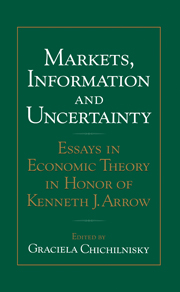Book contents
- Frontmatter
- Contents
- Preface
- List of contributors
- Section I Information and markets
- Section II Uncertainty and finance
- Section III Market externalities and justice
- 8 Moral hazard and independent income in a modern intertemporal-equilibrium model of involuntary unemployment and mandatory retirement
- 9 On the optimal schedule for introducing a new technology, when there is learning by doing
- 10 Price and market share dynamics in network industries
- 11 Exchange in a network of trading posts
- 12 Equilibrium market formation causes missing markets
- 13 Toward a general theory of social overhead capital
- 14 On population externalities and the social rate of discount
- 15 Trade and Welfare
- 16 History as a widespread externality in some Arrow–Debreu market games
- 17 Redistribution by a representative democracy and distributive justice under uncertainty
- Author index
- Subject index
12 - Equilibrium market formation causes missing markets
Published online by Cambridge University Press: 05 December 2011
- Frontmatter
- Contents
- Preface
- List of contributors
- Section I Information and markets
- Section II Uncertainty and finance
- Section III Market externalities and justice
- 8 Moral hazard and independent income in a modern intertemporal-equilibrium model of involuntary unemployment and mandatory retirement
- 9 On the optimal schedule for introducing a new technology, when there is learning by doing
- 10 Price and market share dynamics in network industries
- 11 Exchange in a network of trading posts
- 12 Equilibrium market formation causes missing markets
- 13 Toward a general theory of social overhead capital
- 14 On population externalities and the social rate of discount
- 15 Trade and Welfare
- 16 History as a widespread externality in some Arrow–Debreu market games
- 17 Redistribution by a representative democracy and distributive justice under uncertainty
- Author index
- Subject index
Summary
How markets emerge
Kenneth Arrow (1969) was perhaps the first to point out that markets are not a fixture of the economy, but are the results of decisions made by private economic agents and government agencies. Private agents will establish a market in a particular good only if the costs of doing so are more than met by gains. Such markets are open. Gains are the expected markup over the price paid to owners or producers of the good. Setup costs may be present because there are costs of organization which are independent of scale. These include administration, exclusion, information gathering, and dissemination.
A market for a particular commodity will fail to exist when private calculations show that there is no profit in its existence. No price is quoted and no transactions can take place. Such markets are closed. Market failure arises when private calculations dictate a closed market, but a social calculation shows that a gain is possible through exchange. Government action can make profitable the establishment of a market when there is market failure.
Externality is a case in point: Exclusion is either too costly under existing modes of organization or impossible because property rights have not been established. See Arrow (1969). An auction market in pollution rights could be farmed out to an entrepreneur, if property rights were established, and monitoring mechanisms were sufficiently cheap.
- Type
- Chapter
- Information
- Markets, Information and UncertaintyEssays in Economic Theory in Honor of Kenneth J. Arrow, pp. 235 - 252Publisher: Cambridge University PressPrint publication year: 1999

